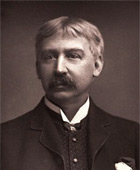Francis Bret Harte (August 25, 1839–May 6, 1902) was an American author and poet, best remembered for his accounts of pioneering life in California. Born in Albany, New York, he moved to California in 1854, later working there in a number of positions, including miner, teacher, messenger, and journalist.
His first literary efforts, including poetry and prose, appeared in The Californian, an early literary journal edited by Charles Henry Webb. In 1868 he became editor of The Overland Monthly, another new literary magazine, but this one more in tune with the pioneering spirit of excitement in California. His story, "The Luck of Roaring Camp," appeared in the magazine's second edition, propelling Harte to nationwide fame.
When word of Dickens's death reached Bret Harte in July of 1870, he immediately sent a dispatch across the bay to San Francisco to hold back the forthcoming publication of his Overland Monthly for twenty-four hours. The poetic tribute, Dickens in Camp, was composed and sent on its way. Dickens in Camp is held by many admirers of Bret Harte to be his masterpiece of verse. The poem is so held for the evident sincerity and depth of feeling it displays as well as for the unusual quality of its poetic expression. The spirit of Dickens breathes through the poems and stories of Bret Harte just as the spirit of Bret Harte breathes through the poems and stories of Kipling.
Determined to pursue his literary career, he traveled back East, to New York and eventually to Boston, where he continued writing poems, sketches, and stories capturing the excitement of his earlier years in California.
As an established literary figure, he was appointed to the position of United States Consul in the town of Krefeld, Germany in 1878 and Glasgow in 1880. In 1885 he settled in London. During the thirty years he spent in Europe, he never abandoned writing, and produced a prodigious output of stories that still maintained the freshness of his earlier work. He died in England in 1902. |






